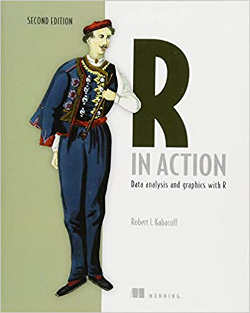| Choosing The Right R Book |
| Written by Kay Ewbank | |||
| Monday, 14 January 2019 | |||
Page 2 of 2
R in 24 HoursAuthor: Andy Nicholls, Richard Pugh, Aimee Gott The only real problem is that the presentation isn't from a programming point of view. If you are a programmer and want to learn R then you will find it hard going because it hardly makes use of the deeper ideas of programing to make things seem easier and logical. From this point of view everything is a special case and you just have to learn how it works. If you aren't a programmer then you are likely to find the approach good as long as you take your time and come back to the book when you need to clarify some aspect of using R. Recommended as long as you know stats and don't want to become a programmer in general - just an R programmer. Author: Paul Teetor For the right reader this is an excellent book, says Mike James, giving it the maximum five stars. While the book is mainly in a cookbook form, there are lots of places where the author feels the need to abandon the cookbook format - and overall the book is better for it. This is a good introduction to R and its basic use. The programming might be a bit too simple for the advanced programmer and the statistics sections a bit too simple for the advanced statistician - but this probably means that there is a big audience who will find some aspect of the book really useful. None of the recipes are advanced or obscure and you could find out how to achieve the same result by reading the documentation - but the book presents things in a much more digestible form. It is worth getting just to have R's approach to data types sorted clearly. Put simply this book isn't essential for the R programmer or the statistician using R but it really will make your life easier when ever you need to do something new. So get a copy.
R for Data Analysis (In Easy Steps)Author: Mike McGrath This particular book takes a very simple approach to using the R language and using it to do simple things - that often turn out to be harder than you might expect, says reviewer Mike Jame. He says It is remarkable value for money., and gives it the maximum five stars. The caveat is that this is a fairly basic introduction to R and it doesn't reach many of the features and facilities of the language. It is also not about statistics or modelling. You don't get any information on linear models, descriptive statistics, contingency tables, etc. The most it does is show you how to draw custom charts which is a still a skill well worth having. The book is an easy read and easy on the eye without going in for the excesses of the "Head First" or "Dummy's" type books.
Within its limits, this is a very good book and you should ignore any reviews that say otherwise simply because they have the level and intent of the book wrong. At the price you can take a risk, even if you aren't 100% sure that it is for you. R in Action: Data Analysis and Graphics with RAuthor: Robert Kabacoff This is the second edition of a book that we thought a lot of when it was first reviewed back in 2011. It is still good! This book could just as easily be reviewed in the Mathematics books section, according to Janet Swift, because it is very heavy on statistical practice. Awarding the book 4.5 stars, Janet said its focus isn't a bad thing, but if you are a programmer looking for a primer on R as a language you might need to look elsewhere. This is not to say that the book is light on details of the R language, but the account is angled towards the practitioner wanting to get to grips with doing some statistics as quickly as possible. It really does answer the question of "how do I" and especially so if you are familiar with any other stats package.
As long as you know much of the theory, it does fill in some gaps for you, and then shows you how to do the job using R. Overall, if you want to discover how to do statistics using R then this is a really good place to start. There's now an expanded second edition that includes new chapters on time series analysis, cluster analysis, and classification methodologies, including decision trees, random forests, and support vector machines. More R booksIf you think we've missed your favorite R title there's a chance we have reviewed it but just not included it in this round up. However, we do know there are more R titles out there - and as new editions of them come out we will try to cover them. Meanwhile if you want to give our reviewers reading recommendations then email Bookwatch.
Also on Programmer's BookshelfPick Of The Shelf - SQL Server Cloud Computing Books Pick Of The Bunch Advanced Java - Books Outside the Core Advanced JavaScript Book Choices JavaScript Beginners Book Choice C# Books - Pick of the Shelf Revisited Reading Your Way Into Big Data Reading Your Way Into Big Data MySQL and MariaDB Database Books Holiday Reading Recommendations
To be informed about new articles on I Programmer, sign up for our weekly newsletter, subscribe to the RSS feed and follow us on Twitter, Facebook or Linkedin.
|
|||
| Last Updated ( Monday, 14 January 2019 ) |

